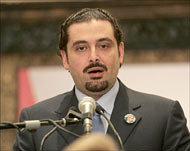UN says al-Hariri killed by truck bomb
A UN-mandated investigation into the February assassination of Rafiq al-Hariri has confirmed that a truck bombing caused the explosion that killed the former premier, the investigation’s chief says.

Detlev Mehlis, a top German prosecutor, told a news conference in Beirut on Friday that the explosion was “without any reasonable doubt above the ground”.
The finding matched that by the Lebanese authority, reported Aljazeera correspondent Abbas Nasir, quoting Mehlis.
Al-Hariri and 20 other people were killed when his motorcade was blown up on 14 February in downtown Beirut.
Some had believed the explosives were buried underneath the street, which they argued would suggest the involvement of officials in the plot, since digging up the street would draw attention and require permits.
Asked whether the truck was parked or moving – which would suggest a bomber – Mehlis said he did not know and was trying to find out.
It was Mehlis’s first disclosure on his work since his team of experts arrived in Beirut in late May.
Protests
Al-Hariri’s killing set off massive anti-Syrian protests, intensifying international pressure for Syria to withdraw its army. Damascus completed the pullout on 26 April.
 |
|
Al-Hariri is campaigning against |
The Lebanese opposition accused Syria and elements in the Lebanese security services of killing al-Hariri, a charge both governments denied.
The investigation continues as Lebanon holds staggered parliamentary elections with a crucial round of voting in the north to come.
Al-Hariri’s son, Saad al-Hariri, is campaigning against people he describes as pro-Syrians and remnants of the Lebanese-Syrian intelligence services.
The opposition used al-Hariri’s assassination in their campaigns in parts of the country, as it tries to wrest control of the legislature from pro-Syrians.
Investigation
The UN Security Council voted unanimously on 7 April to authorise the investigation after a UN fact-finding team concluded that a Lebanese probe into the killing did not meet international standards. The team reported that evidence had been removed, ignored or planted.
Mehlis’s team has three months from Thursday to work, though its mandate can be extended. Besides visiting the site of the bombing, his experts have been reviewing materials and evidence collected by other investigations.
The Lebanese opposition has demanded – and won – the resignation of Lebanese security chiefs and the top prosecutor, who are accused of at least negligence or, perhaps, a cover-up in the local investigation.
The Fitzgerald report also suggested that the security chiefs should step aside.
The new justice and interior ministers, whose portfolios deal with the investigation, are pro-al-Hariri, unlike their predecessors at the time of the assassination.